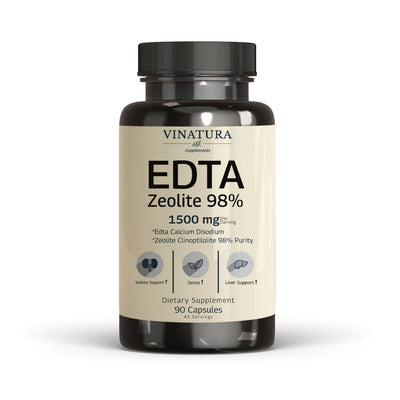
TUDCA vs LIV52: Which One Should You Choose for Liver?
The liver plays an extremely important role in detoxification, metabolism, and nutrient storage in the human body. TUDCA and LIV52, two popular liver supplements, are of great interest to those who care about this. In this article, I will point out the advantages of TUDCA over LIV52 and vice versa, helping you answer the question: "TUDCA vs LIV52: Which One Should You Choose for Liver?"
Before exploring further, please read the disclaimer located at the end of this webpage.
Key Takeaways
- TUDCA and LIV52 are popular supplements for liver health, each with its characteristics.
- Understanding their mechanisms of action, uses, and side effects can help make an informed decision.
- Combining TUDCA and LIV52 can provide additional benefits, but potential interactions must be considered.
TUDCA vs. LIV52: The Comprehensive Comparison

Mechanism of Action
TUDCA: Scientifically, TUDCA (Tauroursodeoxycholic Acid) is a bile acid derivative that helps protect liver cells from stress and apoptosis (cell death). It works by stabilizing the membranes of mitochondria, preventing cell death, and reducing inflammation [1].
TUDCA also enhances bile flow, helping reduce the buildup of toxic bile acids in the liver, thereby improving liver function.
LIV52: On the other hand, LIV52 is an herbal formulation containing plant extracts such as caper bush, chicory, and black nightshade. These ingredients work together to protect your liver.
LIV52 promotes liver cell regeneration, acts as an antioxidant, and supports liver detoxification [2]. It also helps stabilize liver enzymes and improve appetite and digestion.
Uses
TUDCA: TUDCA is primarily used to treat conditions such as cholestasis, where bile flow is impaired, and helps patients reduce symptoms by up to 40% over more than eight weeks of use [3]. It is also used for liver diseases such as hepatitis and cirrhosis, providing impressive results.
Additionally, TUDCA has applications in treating neurodegenerative diseases due to its cell-protective properties. A recent study indicates that TUDCA has effects in preventing and slowing down the symptoms of diseases like Alzheimer's, Huntington's, or Parkinson's [4].
Reflecting these benefits, one Amazon user, Kindle Customer, shared that she felt noticeably better after taking a TUDCA supplement daily.*
LIV52: LIV52 is widely used to support liver function in cases of hepatitis, jaundice, and cirrhosis. It is also used as a preventive measure to protect the liver from toxins such as alcohol and drugs. LIV52 can improve overall digestion and appetite, making it a popular choice for maintaining overall liver health.
In one study, eight people were given 30ml of whiskey in five minutes; after using LIV52, the liver concentrations and indicators showed double the stability compared to those who did not use it [5].
Side Effects
TUDCA: TUDCA is generally well-tolerated, with mild side effects such as diarrhea, nausea, and headaches being the most commonly reported. These side effects are usually temporary and diminish after a period of use. Additionally, TUDCA rarely causes unwanted allergic reactions.
LIV52: LIV52 is also considered safe with minimal side effects. Some users might experience gastrointestinal disturbances such as nausea or diarrhea. However, allergic reactions are very rare but still possible because LIV52 contains multiple herbal ingredients that may interact or react with certain other medications.
TUDCA vs LIV52: Which is Better for Liver Health?

Let's only compare the uses or side effects of the two products, TUDCA and LIV52. It will be difficult to have a perfect answer for everyone. However, based on user feedback, I think TUDCA is a more trusted choice for liver health.
Although both have excellent benefits for the liver, TUDCA seems to show more visible and quicker effects than LIV52. If you browse comparison topics, you will easily see that TUDCA wins the favor of most customers thanks to its effective results.
On the other hand, despite its proven effectiveness, controversies about LIV52 persist, with some arguing that this product has not delivered impressive results. However, that does not mean that LIV52 is completely useless.
Can You Combine TUDCA and LIV52?

The answer is definitely yes. This is also the point I am most excited to share with you in this article. Although TUDCA offers superior and impressive effects and should be prioritized for liver function support, it can be used in parallel with LIV52!
The issue lies in the lack of scientific evidence showing that these two products interact negatively with each other or oppose the idea that they can be used together. This means that if you have the condition, you can use TUDCA along with LIV52 simultaneously.
In the case of consulting health experts, if both are safe, this combination will be the most comprehensive choice for you. However, if you do not have sufficient conditions, prioritize TUDCA first and supplement LIV52 when you can!
Conclusion
In conclusion, both TUDCA and LIV52 bring incredible benefits to liver health, each with its characteristics and mechanisms of action and can bring some side effects. But don't worry too much, I assure you that they will all disappear after a period of use.
Choosing one of the two will largely depend on your needs. As you know, TUDCA provides strong protective effects. At the same time, LIV52 offers a long-term herbal approach to maintaining and detoxifying the liver.
Related Articles:
- Tudca Vs. Milk Thistle: Can You Take Them Together?
- 7 Best TUDCA Supplements for Liver & Biliary Health
References
- [1 ]Heubi, James E., et al. "Tauroursodeoxycholic Acid (TUDCA) in the Prevention of Total Parenteral Nutrition-associated Liver Disease." the Journal of Pediatrics/the Journal of Pediatrics, vol. 141, no. 2, Aug. 2002, pp. 237–2. https://doi.org/10.1067/mpd.2002.125802.
- [2] Huseini, H. Fallah, et al. “The Efficacy of Liv-52 on Liver Cirrhotic Patients: A Randomized, Double-blind, Placebo-controlled First Approach.” Phytomedicine, vol. 12, no. 9, Sept. 2005, pp. 619–24. https://doi.org/10.1016/j.phymed.2004.10.003.
- [3] Cabrera, D., Arab, J.P., Arrese, M. (2019). UDCA, NorUDCA, and TUDCA in Liver Diseases: A Review of Their Mechanisms of Action and Clinical Applications. In: Fiorucci, S., Distrutti, E. (eds) Bile Acids and Their Receptors. Handbook of Experimental Pharmacology, vol 256. Springer, Cham. https://doi.org/10.1007/164_2019_241
- [4] Zangerolamo, Lucas, et al. "The Bile Acid TUDCA and Neurodegenerative Disorders: An Overview." Life Sciences, vol. 272, May 2021, p. 119252. https://doi.org/10.1016/j.lfs.2021.119252.
- [5] ---. "Clinical and Safety Evaluation of Liv.52 in Alcoholic Liver Disease: A Review." Gastroenterology Insights, vol. 13, no. 4, Nov. 2022, pp. 377–86. https://doi.org/10.3390/gastroent13040037.
Testimonial Disclaimer
*The testimonials presented on this website are provided by individuals based on their personal experiences with our products. These testimonials represent individual opinions and experiences, which may not be typical or applicable to all users of our products. Results may vary depending on a variety of factors, including individual health, lifestyle, and adherence to product usage instructions.Author

Product Disclaimer
Including an ingredient or study does not evaluate, endorse, or recommend any Vinatura product or any third-party product. Some ingredients discussed may not be used in any Vinatura product.
The content of the articles has not been evaluated by the Food and Drug Administration (FDA) and is not intended to promote or endorse any specific product. Any products sold on this website are not intended to diagnose, treat, cure, or prevent any disease.
Opinions and Endorsements
Any claims, statements, or opinions expressed in the articles are those of the author(s) and do not necessarily reflect the views or opinions of the manufacturers of the dietary supplement products. The products sold on this website are separate from the content of the articles and are not directly endorsed or associated with the information presented here.
Liability Disclaimer
The author(s) of the articles, website, and manufacturers of the dietary supplement products do not assume any liability for any potential consequences arising from the use of the information provided in the articles. Ingredient effects, dosages, and safety vary by individual, formulation, and context; some ingredients interact with medications or may be unsuitable during pregnancy or lactation. It is recommended that individuals consult with a qualified healthcare professional before making any dietary or lifestyle changes, including the use of dietary supplements.
Product Usage
Please refer to the product labels and packaging for specific usage instructions and guidelines for the dietary supplement products sold on this website.
Customer Support
For any concerns or questions regarding the dietary supplement products, please contact our customer support team, who will be more than happy to assist you.






Leave a Comment
Be the first to comment.
What do you think?